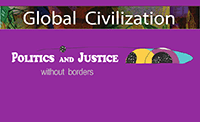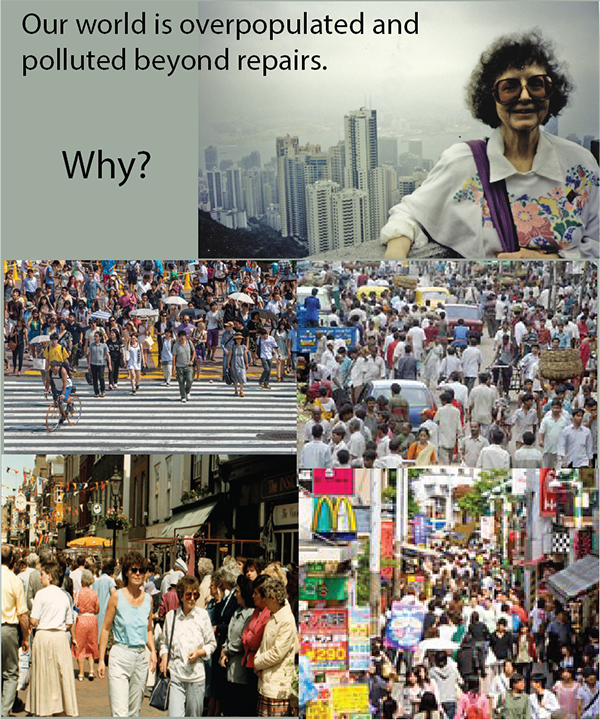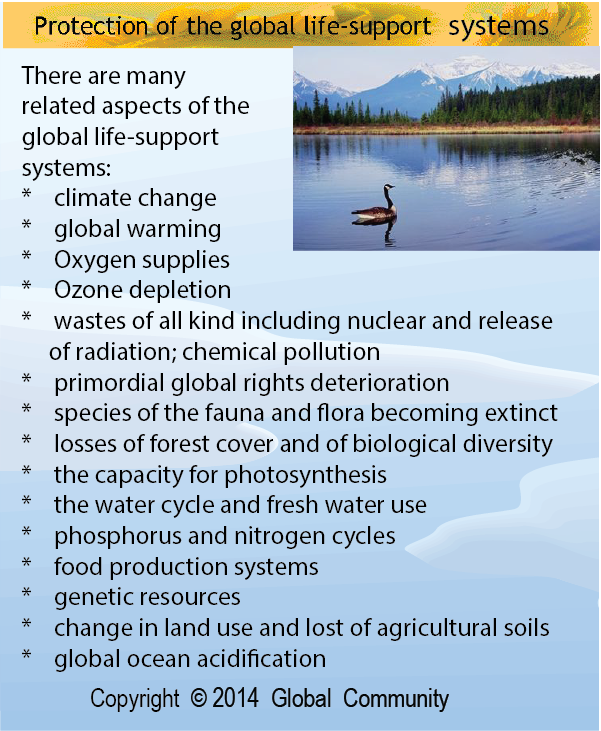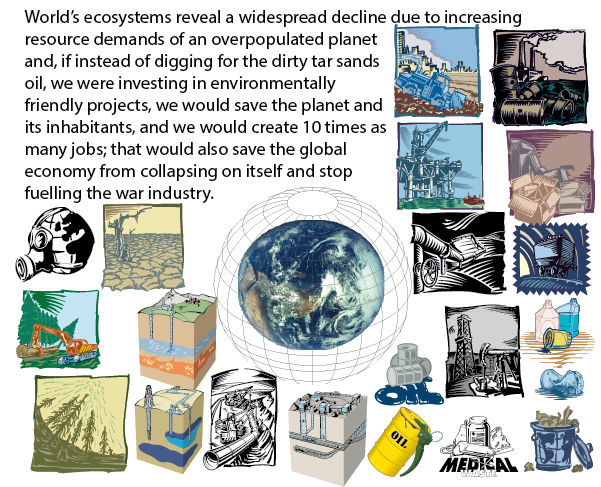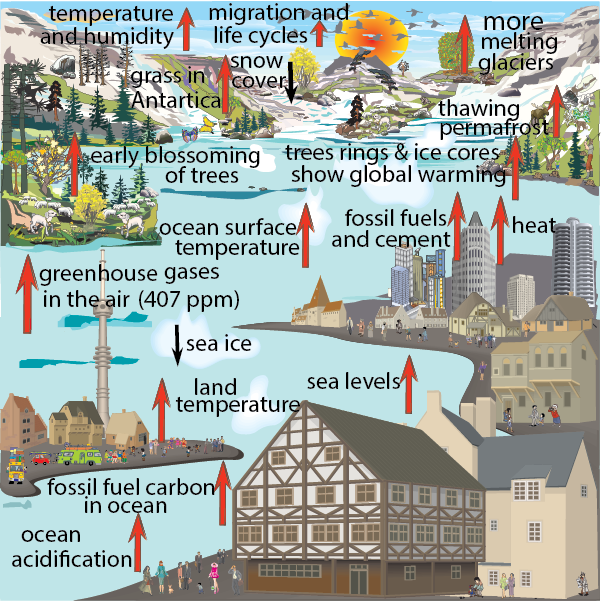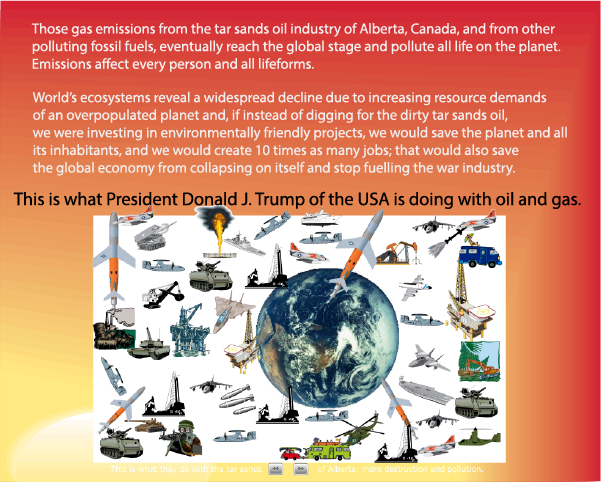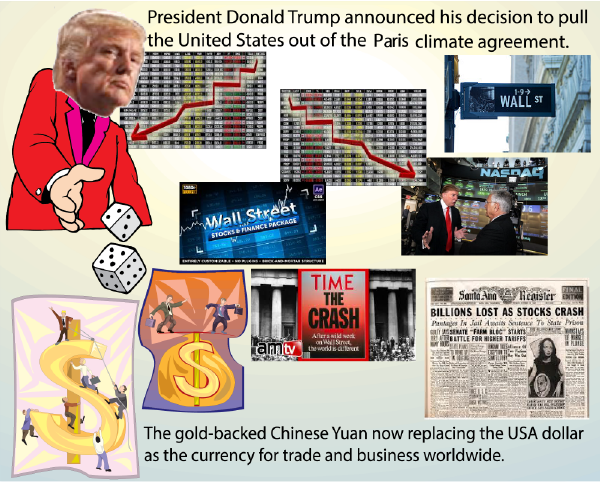Volume 16 Issue 5 February 2018
Global warming, business, and international trade agreements.
Back to February 2018 Newsletter
Our world is populated with living beings consisting of millions of different life forms in different ecosystems interacting with each other to survive. The interaction and interdependence between land, water, the atmosphere, plants, and life forms are the driving force that creates and maintains an ecological, environmental equilibrium that has sustained life on Earth for millions of years enabling it to evolve, flourish and diversify. Global Civilization values Earth’s diversity in all its forms, the non-human as well as the human. Global citizens truly want to protect this wonderful diversity of life that human activities are aimed to destroy.
It's time for us to come to terms with reality. We need ways of organizing ourselves to help us live in a world with less energy and fewer material goods. We are exploiting our natural resources, minerals and fuels faster than we are gaining access to alternative sources. We are polluting the natural environment faster than the environment can regenerate itself to reach the level suitable for human needs.

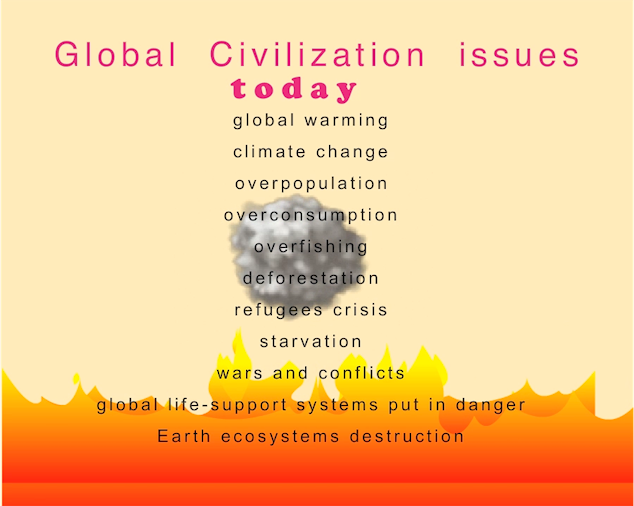
We are changing the global climate dangerously. Our attitude and way of life show a moral degradation toward the existing forms of life on the planet. It's time for us to protect what is left to protect: life itself on Earth. Our ways of doing business and trade are certainly the major areas to change in our lives. Let us have a quick look at trade.
An international trade agreement usually involves an exchange of capital, goods and services from country to country, and represents a significant share of Gross Domestic Product (GDP). There is always a money flow: inflow and outflow. Trading globally gives consumers and countries the opportunity to be exposed to goods and services not available in their own countries. A multiple of products can be found on the international markets: food, clothes, oil and gas, wine, spare parts, jewelry, water, stocks, currencies, war industry products ...etc. Multiple services are also traded: banking, tourism, consulting, investments, travel, transportation services, a range of business and professional services referred to as commercial services, and government services...etc.
On the other hand, "free trade" allows traders to act and transact without coercive interference from government. It usually means no taxes on manufacturing goods and no tariffs paid when goods cross a border. A "free trade" agreement may have different goals:
1. A common market with a full customs union;
2. A custom union allowing a free trade among members but requires a common external trade policy towards non-members; and
3. A free trade agreement allowing free-trade among members, but each member can have its own trade policy towards non-member countries.
Today, for a business, the importance to engage in international trade is very clearly to:
1. Maintain cost competitiveness in the domestic market;
2. Expanding sales and gaining global market share;
3. Deal with specialized industries;
4. Lower production costs in one country versus another;
5. Access to natural resources of another country; and
6. Making available to consumer tastes and choices that are only found in another country or are more competitive from another country.
And there are trade barriers often imposed by government to protect local businesses:
1. standards, labelling, testing, types of certification;
2. import policies reflected in tariffs quotas, licensing, customs practices;
3. subsidies for local exporters;
4. non-existent copyright protection;
5. restructions of foreign direct investments; and
6. restrictions on licensing, franchising, and technology transfer.
Global Civilization argues that there are forces affecting trading in global markets. Many have already been mentioned above here. Those forces are often a combination of socio-cultural aspects with economic, financial, legal, regulatory, resources and environmental aspects. Global Civilization recognizes and takes into account the impacts of business and trade over the survival of life on our planet and for ourselves and the next generations of people. When doing so, it becomes obvious that international or global trade agreements are all obsolete, ancient and primitive.
The argument for "free trade" insists on the idea that countries should specialize in certain products that they are good at producing and buy from other countries what they are not good at producing, so that the economy is more efficient. What kind of efficiency is it, when the pieces of a product are sent half way around the world to be assembled in a country with cheap labour, then shipped back to be sold? It may be profitable to some businesses, but it is a waste of time and energy as well as resources, and moving products this way is not environmentally friendly and is a significant threat to the global life-support systems of our planet. What kind of efficiency is that? Huge amounts of money are spent on marketing to get people to buy things that they don't truly need. Where is the efficiency in that? Recognizing and understanding the human population in its role as a consumer being is very important because consumers collectively spend two thirds of a country’s GDP. They buy and influence the purchase of an increasingly wide array of products. Despite the fact that we are making consumer decisions in an emerging Global Civilization, people are still being taught how to be "good consumers", when actually the word consume means, "to destroy, use or expend". The enormous productive capacities and market forces of the planet have been committed to satisfying human needs and desires with little overall regard to the short-term and long-term future of life on the planet, or life in other nations and of future generations.
"Free trade" entrenches corporate power at the expense of democratically elected officials from local communities, municipal governments, provincial governments, national governments and states. It is a form of "world anti-government" as citizens lose the ability to act in their best interests and find sound solutions to their own problems. Citizens become disconnected with the decision-making process. Their lives are then driven by the desire of making profits, and that is how trade affects our ways of doing business in the worst possible ways. In such scenario, democratic principles lose meaning and no longer prevail. All that we have worked for over the past decades to build sustainable communities is gone with free trade. The principles of a sustainable development are let go and replaced by the desire of the world business leaders to make larger profits. Global Civilization wants to change trade agreements worldwide to be in terms with reality, the real situation on the land everywhere.
Today, there exist many international trade agreements such as: Trans Pacific Partnership Agreement (TPPA); World Trade Organization (WTO); North American Free Trade Agreement (NAFTA; 1994); Free Trade Area of the Americas (FTAA); Brazil, Russia, India, China and South Africa (BRICS); European Union (EU); and many more international trade agreements between nations. Today's international trade agreements are obsolete, ancient and primitive. They exist to make a few people on the planet rich and creating a world of overconsumption and inadequately, unproductively and wastefully degrading the planet's resources, the global environment, and the global life-support systems. Let us walk into a sustainable future. All international trade agreements must be administered by the Global Trade and Resources Ministry. Love the world, save the world. Yes! Let us manage the world wisely and sustainably.
Earth management includes the entire process of doing things. When we do exploration work, develop, manufacture, produce, mine, farm or create a product, we become legally and morally responsible and accountable of the product from beginning to end. This product may be anything and everything from oil & gas, weapons, war products, construction products, transportation and communications products and equipment, food products, to genetically engineered food products. All consumer products! All medical products! All pharmaceutical products! In order words, a person (a 'person' may be an individual, a community, a government, a business, an NGO, or an institution) becomes responsible and accountable for anything and everything in his or her Life. Global population is this 'person'.
Over the last century humanity has been depleting and degrading the natural capital of Earth, its global resources, rich agricultural soils, its groundwater stored during ice ages, and its biodiversity. Overpopulation and increasing per capita consumption are major reasons for the depleting of resources. Politicians and business executives are under the delusion that such a disastrous end to the modern human enterprise and institutions can be avoided by technological fixes that will allow the population and the economy to grow forever. People from Wall Street live a dream life. Our current way of life is unsustainable. We are the first species on Earth that will have to self-consciously impose limits on ourselves if we are to survive.
Can we really believe this world can go forward indefinitely, a few decades? We are seeing the end of the era of cheap fossil energy, and there is no viable large-scale replacements for that energy. We are seeing the near end of all global resources needed for our survival.
The health of the planet is not what Wall Street is showing us. The reality is that we see more trends such as :
Is this a sustainable system? We need to recognize the failure of fundamental systems, and to abandon the notion that what there is to do is recalibrate the institutions that structure our lives today. We need to realize that the way we thought things would work out truly is gone. Capitalism is at the core of this unsustainable system. It gives rise to the high-energy/mass-consumption configuration of privileged societies. We must set-up measures to stop speculators from benefiting from the misery of others, by punishing corrupt politicians, and by collectively understanding that bankers are rich because we have placed our money in their hands. Ultimately, unless we begin to see the world as a whole, in which things are truly interconnected, our governments will continue their hostilities, oil resources and many global resources fundamental to life survival, will keep on decreasing, and when the time comes for us to complain, we will be faced with the guns of the police whom we have helped to create with the payment of our taxes. Let us change what needs to change and evolve to the new way of doing things on our planet.
- in 2017, the concentration of CO2 greengases in the atmosphere was measured to be 407 ppm, a critical increase never seen for decades and which implies a fast exponential growth of global warming and climate change worldwide;
- degradation of the environment through resource extraction;
- air, soil, and water pollution;
- acid rain;
- biodiversity loss;
- fuelling of the war industry, and therefore a threat to peace and Earth security and, in consequences, a threat to the global life-support systems;
- global economic losses due to natural disasters are in line with events anticipated as a result of global warming;
- political, economic and military conflicts over limited global resources such as oil and fresh water become more important as demand increases;
- reliance on fossil fuels create less jobs; renewables create four times more jobs; yet nations such as America downplay the development of renewables;
- groundwater contamination;
- high levels of toxicity in air, land and water globally;
- significant topsoil loss worldwide;
- widening inequality in the world creating social unrests and conflicts;
- the intensity of the violence and social chaos;
- war over oil and gas, and other global resources;
- extensive and destructive forest fires and weather systems; devastating floods every year;
- every day thousands of container ships are transporting goods on all oceans, dumpings polluted residues in the water, and creating noise pollution with their engines thus making it impossible for mammals and other marine life forms to survive; and
- the desperation that so many feel at every level of society.
Over the past decades, Global Civilization has been promoting the formation of several global ministries for the proper governance of Earth. And that is the new way! Global ministries are world wide organizations just like the World Trade Organization (WTO) for trade and therefore should have the power to rule on cases as that of the WTO. The formation of global ministries is the most important event in human history. Humanity sees the need to manage the world affairs in several aspects of our lives: energy, agriculture, environment, health, Earth resources, Earth management, security and safety, emergencies and rescues, trade, banks, speculation on world markets, peace, family and human development, water resources protection, youth, education, justice, science and technology, finance, human resources, ethics, global rights, sustainable development, industry, and the manufacturing and distribution of products. Global ministries will be given power to rule themselves in harmony with each other. Let us start developing the most critically important global minitries.
And this can be effectively accomplished when the organizational structure of the government of each nation-state includes a Ministry of Global Peace in government and a Global Ministry of Essential Services. We can all co-operate together better this way when all people are prepared and able to do so. Register your Ministry with Global Civilization.
Because of the limited quantities of Earth resources to be made available for this generation and the next ones, and because of environmental, climate change, and world population concerns, there is a need to manage the entire process of using Earth natural resources. The most needed global resources for our survival must be managed first. Certainly, after our needs for water and food, petroleum resources are most needed, and because of the destructive aspects of fuel products to the global environment, creating global warming and climate change, humanity needs to make those products our first priority. And we all know that the amount of oil left in the ground in the world has already passed its peak quantity. So why waste the oil on doing things we know are nothing but a waste of energy and often used for destruction and certainly will shorten the life span of the next generations. A Global Trade and Resources Ministry is needed to look after the sustainable management of Earth resources at all stages: exploration, production, transportation, manufacturing and distribution. This ministry also includes the management of all critically important global resources needed for our survival.
For the first time in human history, and the first time this millennium, Global Civilization has proposed a benchmark:
* formation of global ministries in all important aspects of our lives;Global Civilization has no intention of changing the status and privileges of state governments. In fact, state governments become primary members of Global Civilization. Global governance can only be effective within the framework of Global Civilization. Global Civilization has put forward a different kind of global leadership, governance and management. As Global Civilization begins to take on a much deeper kind of global leadership, one that earns more respect than envy and more gratitude than hatred, one that can catapult the whole planet forward into a future where war is no longer thinkable between nation-states and a legitimate and beneficial Earth governance is able to cope with global problems. What Global Civilization is most interested about is our ways of doing business and trade.
* the Scale of Global Rights as a replacement to the Universal Declaration of Human Rights;
* an evolved democracy based on Global Civilization principles and values;
* a central organization for the restoration of the planet and Earth governance: Global Civilization;
* the Earth Court of Justice to deal with all aspects of the governance and mangement of the Earth;
* a new impetus given to the way of doing business and trade;
* more new, diversified (geographical, economical, political, social, business, religious) symbiotical relationships between nations, communities, businesses, for the good and well-being of all;
* proposal to reform the United Nations, the World Trade Organization, the World Bank, the IMF, NAFTA, FTAA, and to centralize them under Global Civilization;
* the Peace Movement of Global Civilization and shelving of the war industry from humanity;
* a global regulatory framework for capitals and corporations that emphasizes global corporate ethics, corporate social responsibility, protection of global rights, the environment, community and family aspects, safe working conditions, fair wages and sustainable consumption aspects;
* establishing freshwater and clean air as primordial human rights.
When looking across cultures of geo-cultural areas and across millennia, certain human virtues have prevailed in all cultures, the major ones include wisdom, knowledge, courage, justice, love, truth, empathy, kindness, and social intelligence. These virtues were not always incorporated into the ways of doing business because the 1% business world became corrupted, greedy, no longer in line with humanity's survival on the planet, and more interested in keeping most of the wealth, resources and power for themselves keeping the remaining 99% of the world population in poverty. But today we are going to incorporate these virtues and proper behaviors into corporate citizen global ethics.
< />

Global Civilization proposes that from now on a corporation will be required to operate its business within Global Civilization as per global ehtics:
* Be concerned with issues such as climate change, bio-diversity, pollution prevention and adopt high standards;
* Minimize environmental degradation and health impacts;
* Be responsible for the environmental impact of its products and services throughout their cycle;
* Adopt a wide environmental code, and policies, health and safety practices and procedures aimed at reducing resource and energy use in each stage of a product or service life-cycle;
* Set up appropriate management systems to implement policies;
* Conduct annual checks and balances and provide reports to the community;
* Respect the political jurisdiction of national communities;
* Respect human rights, social and cultural rights ;
* Recognize its political and economic impact on local communities;
* Contribute to the long-term social, cultural, environmental and economic sustainability of the local communities;
* Respect the rights of indigenous peoples, their culture and land, and their religious and social customs; provide employment and training opportunities ;
* Ensure that each employee is treated with respect and dignity and is not subjected to any physical, sexual, psychological or verbal harassment or abuse;
* Respect employees' right to freedom of association, labour organization, and free collective bargaining;
* Provide equal pay for work of equal value;
* Recognize the responsibilities of all workers to their families, and provide for maternity leave, and paternity leave;
* Ensure that their be no barriers to the full participation of women within a business and government;
* Participate in the creation of child care centres and centres for the elderly and persons with disabilities where appropriate;
* Ensure no discrimination on grounds of race, ethnicity, gender or culture;
* Ensure that persons with disabilities who apply for jobs with the company receive fair treatment and are considered solely on their ability to do the job; provide resources and facilities which enable them to achieve progression in employment in the company;
* Provide training to all employees to conduct their activities in an environmentally responsible manner;
* Work with organizations concerned with children's rights, human rights and labour rights to ensure that young workers are not exploited;
* Ensure that a mechanism is in place to address ethical issues of concern raised by employees;
* Make sure that the company's policies balance the interests of managers, shareholders, employees, and other affected parties;
* Adhere to international standards and protocols relevant to its products and services;
* Adopt marketing practices which protect consumers and ensure the safety of all products;
* Conduct or support research on the environmental impacts of raw materials, products, processes, emissions and wastes associates with the company and on the means of minimizing such adverse impacts;
* Make a sustainable use of renewable natural resources such as water, soils and forests;
* Conserve non-renewable natural resources through efficient use and careful planning; and
* Conserve energy and improve energy efficiency of internal operations and of the goods and services being sold.

